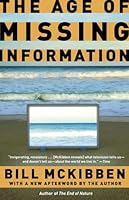 Book cover via AmazonBill McKibben is a Christian environmentalist; or rather he's both a Christian and an environmentalist, and one of the people I want to look to in my effort to reconcile my values on one side (the Christian side, for lack of a better word) with the values on the other side (the uneasy side; the countercultural side). I first discovered him through Long Distance, a book he wrote about taking a year off to train as a cross-country skier. I liked that book a lot: it was short, it was linear, it was a personal narrative with a strong human voice, and it was a book about an obsession.
Book cover via AmazonBill McKibben is a Christian environmentalist; or rather he's both a Christian and an environmentalist, and one of the people I want to look to in my effort to reconcile my values on one side (the Christian side, for lack of a better word) with the values on the other side (the uneasy side; the countercultural side). I first discovered him through Long Distance, a book he wrote about taking a year off to train as a cross-country skier. I liked that book a lot: it was short, it was linear, it was a personal narrative with a strong human voice, and it was a book about an obsession.I'd heard about The Age of Missing Information some years ago: McKibben gets tapes of everything broadcast on the Fairfax cable system, then sits down and watches it all. In the book he contrasts this with a day spent hiking, camping, and swimming in the Adirondacks.
There are several ways to approach a narrative like this; one is to lay out facts for the reader and encourage him toward conclusions. Another is to lay out a narrative and fit bits of story into it. McKibben chooses the latter, and the book suffers for it. This is a problem that crops up repeatedly with these adventure-as-activism narratives: Barbara Ehrenreich doesn't make the choices a real person who had to live on the proceeds from a minimum-wage job would have to make, and she doesn't take advantage of all the services society offers someone in that position: no earned income credits on her taxes, no food stamps, no public transit, etc. Judith Levine splurges and compromises until her experiment in not buying things is empty and silly, so she pads out the book with protest rallies.
McKibben doesn't compromise; his narrative is subjective from the beginning. He doesn't tell us what he watched, and he doesn't tell us where he went camping, etc. So while his experience may have been valid his representation of it is just one long unbroken appeal to experiences we haven't shared and can't observe. And while I'm not that eager to visit his idyllic Adirondacks village, I guess I found myself discounting every uncritical thing he had to say about it.
I guess what I'm saying is this: I think his book would have been improved substantially if he'd bothered to share the Fairfax cable TV schedule with us, instead of just his impressions of it, arranged to suit his points.
Instead what we get is an impressionistic portrait of the day arranged in chapters with headings that suggest that they took place at different parts of the day: 10AM, 2:30PM, Twilight, Deeper Twilight, etc. Against this background McKibben arranges sections about how television is ruining society because it does various things: presents lots of a certain kind of information, but none of another kind, portrays unrealistic lifestyles, suggests unrealistic expectations for conflict resolution, etc. Unfortunately this too is weakened by the lack of facts in his story: he tells two stories, one about a future we can interpret and another about a past we can't see, and suggests that one of them is better than the other, but without suggesting anything helpful for moving from one to the other.
I very badly wanted to like this book: I like the idea of watching everything that can be seen on one cable system in one iconic day. But I honestly don't care how homesick Bill McKibben is for some disappearing past; he's welcome to go live there as far as I'm concerned.
In the interest of full disclosure I'll say the following: I don't own a television, and haven't lived in a house that had one in over a year. I haven't watched the late local news in years, and I couldn't tell you if for example Nightline is still on the air. I suspect that we'd all be better off if we were more in tune with the cycle of seasons and could feed ourselves from our own little gardens, etc. I just found this book to be a needlessly emotional nostalgic soup. And I was insulted by the author's approach of sticking fact-like things to a narrative rather than making observations and presenting us with warranted conclusions.
Oh yeah: I'll probably read more McKibben. But it'll be a while.
![Reblog this post [with Zemanta]](http://img.zemanta.com/reblog_c.png?x-id=2a139653-e03e-4c84-9b4f-6166a0afd688)

No comments:
Post a Comment